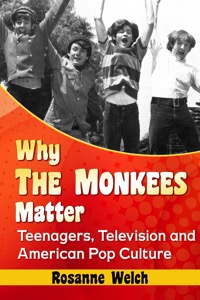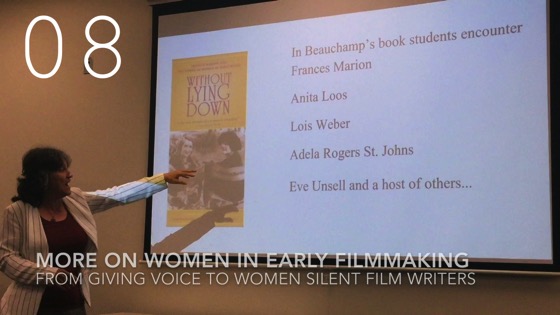01 Introduction from How Gidget Got Into the Girl Ghetto – Dr. Rosanne Welch – SRN Conference 2017 ![How Gidget Got Into the Girl Ghetto - Dr. Rosanne Welch - SRN Conference 2017 [Video] (23 mins)](https://rosannewelch.com/wp-content/uploads/2017/10/gidget-srn.png)
Watch this entire presentation
Transcript:
Hi everybody! It’s so wonderful to have you here. I’m going to be talking about a book and a film and a television series and I think the trajectory from serious to bubblegum back to slightly serious is what’s interesting to me and it’s all about the adaptation of something and how the true person’s story can get lost along the way and I believe TV allows a chance to tell longer stories — you can tell a hundred hours in the life of a person instead of two hours and so I think we’re going to end up discovering that TV was the better place for this story to house itself.
At this year’s 10th Annual Screenwriting Research Network Conference at Otago University in Dunedin, New Zealand I presented…
“How Gidget Got Into the Girl Ghetto by Accident (and How We Can Get Her Out of it): Demoting Gidget: The Little Girl with Big Ideas from Edgy Coming of Age Novel to Babe on the Beach Genre Film via Choices made in the Adaptation Process.”
It’ a long title, as I joke up front, but covers the process of adapting the true life story of Kathy Kohner (nicknamed ‘Gidget’ by the group of male surfers who she spent the summers with in Malibu in the 1950s) into the film and television series that are better remembered than the novel. The novel had been well-received upon publication, even compared to A Catcher in the Rye, but has mistakenly been relegated to the ‘girl ghetto’ of films. Some of the adaptations turned the focus away from the coming of age story of a young woman who gained respect for her talent at a male craft – surfing – and instead turned the focus far too much on Kathy being boy crazy.
Along the way I found interesting comparisons between how female writers treated the main character while adapting the novel and how male writers treated the character.
Dr. Rosanne Welch
Dr. Rosanne Welch teaches the History of Screenwriting and One-Hour Drama for the Stephens College MFA in Screenwriting.
Writing/producing credits include Beverly Hills 90210, Picket Fences, ABCNEWS: Nightline and Touched by an Angel. In 2016 she published the book Why The Monkees Matter: Teenagers, Television and American Pop; co-edited Women in American History: A Social, Political, and Cultural Encyclopedia; and placed “Transmitting Culture Transnationally Via the Characterization of Parents in Police Procedurals” in the New Review of Film and Television Studies. Essays appear in Torchwood Declassified: Investigating Mainstream Cult Television and Doctor Who and Race: An Anthology. Welch serves as Book Reviews editor for Journal of Screenwriting and on the Editorial Advisory Board for Written By magazine, the magazine of the Writers Guild.
Watch Dr. Welch’s talk “The Importance of Having a Female Voice in the Room” at the 2016 TEDxCPP.
The Screenwriting Research Network is a research group consisting of scholars, reflective practitioners and practice-based researchers interested in research on screenwriting. The aim is to rethink the screenplay in relation to its histories, theories, values and creative practices.
Podcast: Play in new window | Download
Subscribe: RSS

![Teaching Character and Structure from Giving Voice to Silent Films and the Far From Silent Women Who Wrote Them with Dr. Rosanne Welch [Video]](https://rosannewelch.com/wp-content/uploads/2017/12/ufva-11-character-structure.jpeg)








![31: A New Monkees Album and Conclusion : “Why The Monkees Matter” Interview with Jean Power [Video]](https://rosannewelch.com/wp-content/uploads/2017/12/rmw-power-31-good-times-conclusion.jpeg)

![Silent Films and Diversity from Giving Voice to Silent Films and the Far From Silent Women Who Wrote Them with Dr. Rosanne Welch [Video]](https://rosannewelch.com/wp-content/uploads/2017/12/ufva-10-diversity.jpeg)
![30: International Fame and The Monkees : “Why The Monkees Matter” Interview with Jean Power [Video] (0:58)](https://rosannewelch.com/wp-content/uploads/2017/12/rmw-power-30-international.jpeg)

![29: Writers, Producers, and The Monkees : “Why The Monkees Matter” Interview with Jean Power [Video]](https://rosannewelch.com/wp-content/uploads/2017/12/rmw-power-29-writers-producers.jpeg)

![28: Coslough Johnson and The Monkees : “Why The Monkees Matter” Interview with Jean Power [Video] (0:52)](https://rosannewelch.com/wp-content/uploads/2017/11/rmw-power-28-coslough-johnson.jpeg)
